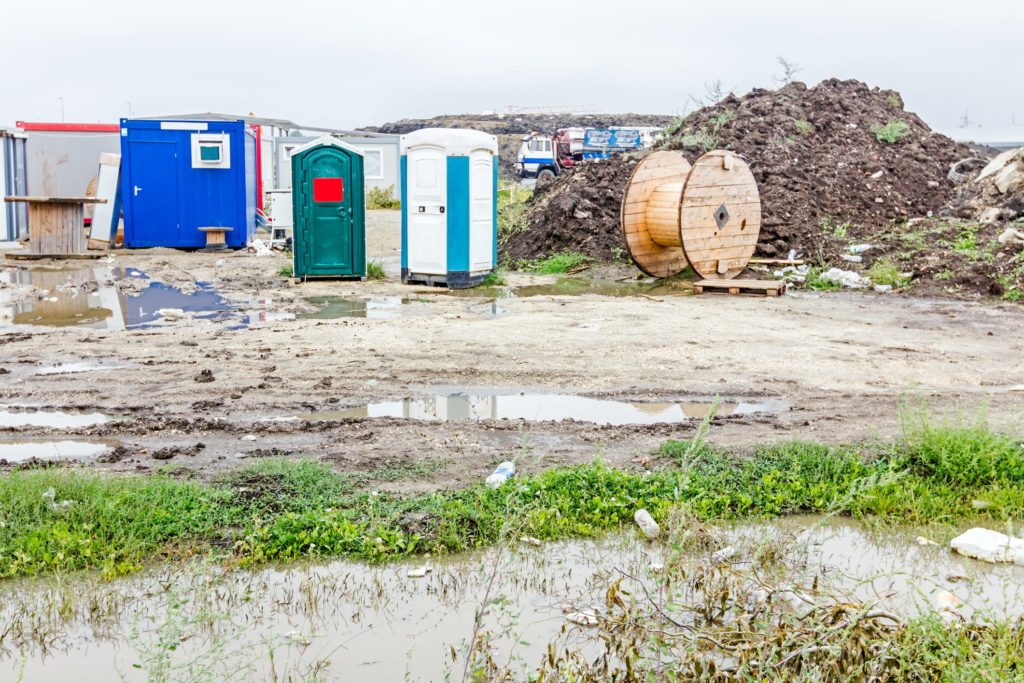
[vc_row][vc_column][vc_column_text]Most companies do their best to ensure that remote teams have the best protection. Not just because they have OSHA compliance issues, but because they want to keep employees safe and productive.
Have you overlooked your sanitation safety requirements from OSHA? You might be out of compliance, exposing your company to unnecessary risk.
Some of your workforce may not work in a traditional office setting. Instead, they’re on worksites or in their vehicles. Providing OSHA standard bathroom facilities looks a little different for them.
To keep your company OSHA compliant and your mobile team of linesmen, technicians, and engineers healthy, you must provide “adequate access,” meaning you have to supply them with bathroom services in 10 minutes or less.[/vc_column_text][vc_column_text]
It is a threat to expect your employees to make the right choice and protect your company from embarrassing situations.
Right now, Amazon is facing a lot of scrutiny in the UK due to:
In Levittown, NY, a Long Island Power Authority employee was caught on a security camera urinating on a customer’s fence and house.
What about putting the general public at risk, not just private property? In California, a water manager with the water bureau urinated into an empty reservoir. You would think that a manager would have the common sense to know that even an empty reservoir is a lousy judgment call for a safe place to answer the call of nature. Leaving workers to figure out where to take a bathroom break can put a company’s reputation on the Line.
These incidents, which are not isolated, deteriorate a company’s credibility and reputation.[/vc_column_text][vc_column_text]
Portable toilets are ubiquitous on construction sites, and they are also hotbeds of viruses that can sicken your workforce.
The top 5 viruses transmitted in these environments include:
And now, we can add #6:
Portable toilets become unsanitary fast. Compound this with a lack of personal cleaning supplies, including toilet paper and hand sanitizer, and you have a toxic nightmare.
Portable toilets are not ideal.[/vc_column_text][vc_column_text]
Trusting employees to make the right decision about where and when to go to the bathroom can have undesired results. We know that as a company, you would never tell an employee to pull over on the side of the road, but it happens.
Employees wearing company-branded clothing and driving company-branded vehicles can get ticketed or filmed. This can create unintended expenses for PR, legal, and lead to fines; not to mention the environmental impact. Despite what our parents told us, it is not okay to pee behind a bush. It destroys habitats, damages soil, and leads to bio-hazards.
Don’t even get us started on the bio-hazard of peeing in a bottle.[/vc_column_text][vc_column_text]
Companies lose hundreds of thousands of dollars every year due to:
The average person needs to use the restroom three times during a workday. When on a site with portable toilets, it can take people up to 15 minutes to use the bathroom due to:
That equals 45 minutes per employee of lost productivity per day, which averages out to about $6,000 a year, per employee.
Further, if there are no toilets that are not on-site, employees have to drive to use a bathroom in another business, adding a commute time to that bathroom break for utility workers, increasing your costs exponentially.[/vc_column_text][vc_column_text]
Brief Relief offers bathroom portable solutions that are:
Brief Relief is a system that allows your workers to have a restroom wherever it needs to be.
Mobile Employee Solution:
Construction Site Employee Solution:
All products are:
These products reduce human waste to the point where it is safe to dispose of in any trash receptacle.
Keep your employees happy and healthy – and your company’s reputation, un-soiled.[/vc_column_text][/vc_column][/vc_row]
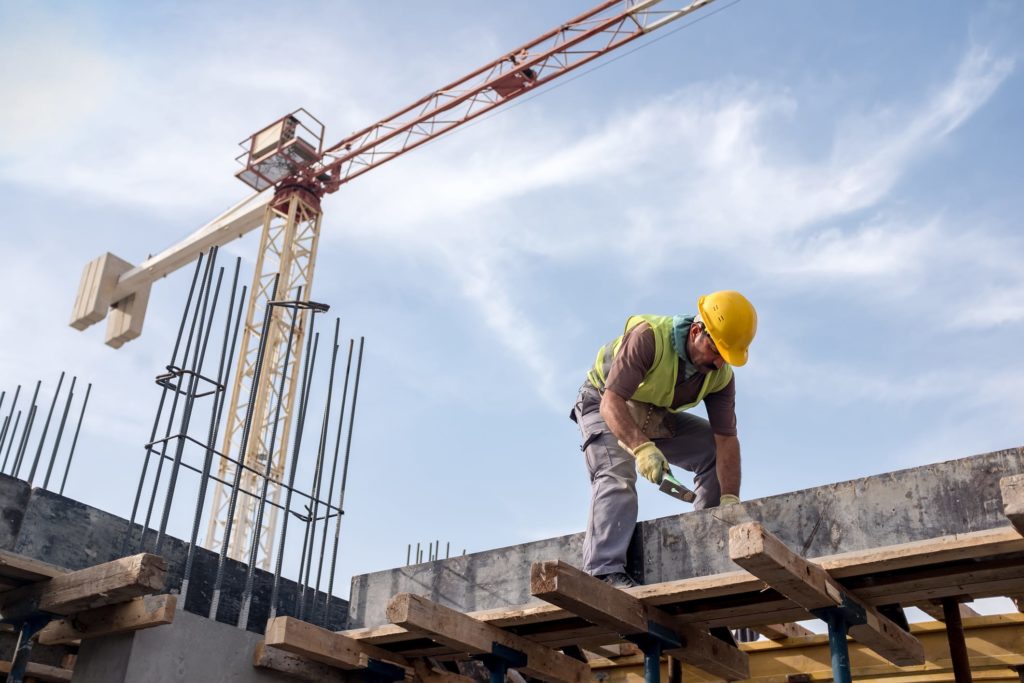
[vc_row][vc_column][vc_column_text]With so many scenarios going on during this pandemic, ensuring job site safety in the workplace is key. It’s vitally important to not only train employees, but have control measures in place that prevent the spread of infection.
There are multiple measures that can assist in ensuring job safety:
According to the Centers for Disease Control (CDC), all employees should understand what a pandemic is; what types of activities or jobs that may put them at risk for exposure; options for working remotely, or sick policies; social distancing strategies; good hygiene and disinfection procedures; the types of PPE available and how to wear and use it; and how communications between management and employees will take place moving forward.
[/vc_column_text][vc_column_text]
When working around biohazards, maintaining safe restroom facilities is crucial in keeping employees safe. The use of Brief Relief products has been instrumental in keeping working conditions sanitary. The use of a portable restroom with privacy screens can keep the spread of infection down, as there are no facilities to maintain. Workers in highly sensitive and contaminated situations should also use face shields whenever necessary to prevent particles from reaching their faces when working. Face shields, compared to face masks, don’t itch and people are less likely to rub their eyes, infect themselves, and infect others if the wearer is contagious. The overall objective is to save both time and money while keeping employees safe.
The Disposa-John Portable Restroom works with a commode to capture waste, break it down and convert it into a deodorized gel. This helps keep everyone safe while providing the services needed to keep essential operations going. For field workers and those who are in makeshift camps, this is a sterile, working alternative when there are no restroom facilities available. These solutions will also work well in establishments where more restroom facilities are needed due to new social distancing policies. There are training videos and other resources available on how best to use these products effectively while keeping employees safe.
As businesses and other areas start to reopen, having tips and protocols posted throughout the area helps remind workers of the general guidelines for workplace safety. All federal, state, and local policies must also be considered when implementing these protocols. By following these guidelines and safety measures, employees will have the highest set of standards and protections in place.[/vc_column_text][/vc_column][/vc_row]
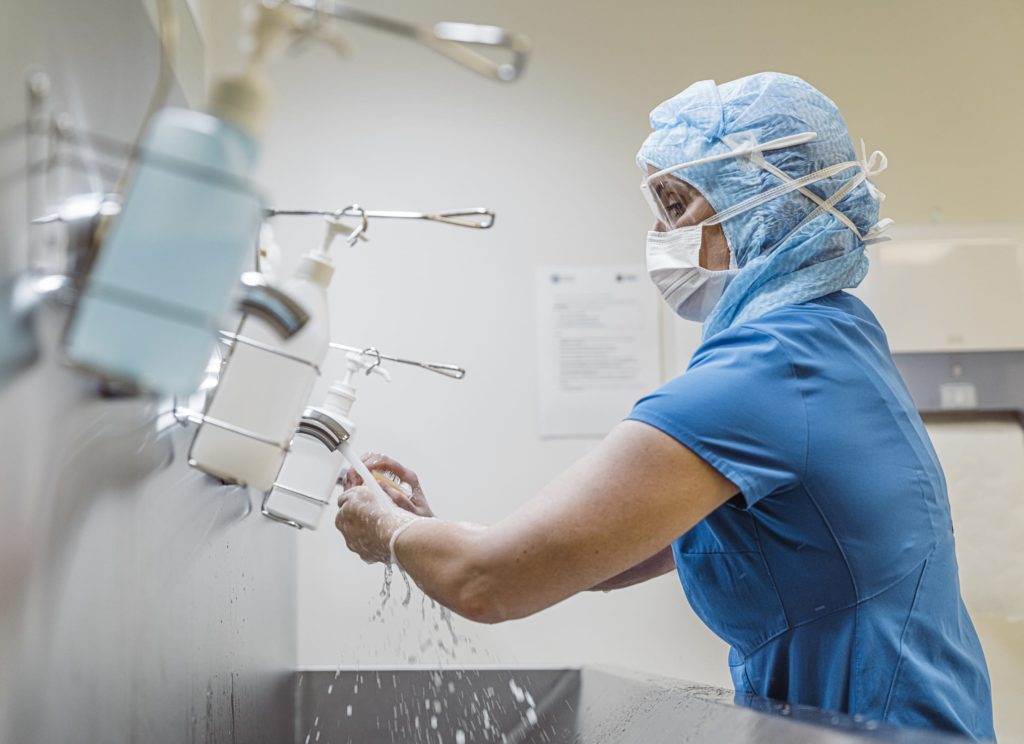
[vc_row][vc_column][vc_column_text]
It’s important for medical professionals to stay healthy and prevent the unwanted spread of illnesses throughout the year.
Regardless of the virus or bacteria that is causing illnesses across the country, medical professionals in hospitals, nursing homes, and rehabilitation centers are at the highest risk for contracting and spreading illnesses. As the first line of defense, these individuals must stay healthy in order to protect those who need their services.
The following 10 ways will help medical professionals prevent the spread of unwanted bacteria/viruses:
[/vc_column_text][vc_column_text]
Continue reading this blog post to learn more about how Brief Relief products keep those in medical facilities safe and healthy.
1. Portable Toilet Waste Bags
Brief Relief’s environmentally friendly products allows for liquid waste using our disposable waste bags. The Brief Relief Disposable Urinal Bag is our most popular product and instantly transforms urine into a deodorized gel. The special blend of polymers and enzymes allow human waste to be disposed of in normal trash cans.
The Disposa-John Portable Restroom will take care of any solid or liquid waste. This bag is a one-time use sanitary waste bag containment system that allows men and women to easily and hygienically answer nature’s call. When public bathrooms cannot be sanitized in between each use, these environmentally safe products allow all medical professionals the ability to go without worry of spreading germs. An antimicrobial wipe and toilet paper for extra sanitation is included for easy cleanup. These disposable waste bags for portable toilets can be combined with commode systems and privacy shelters to provide peace of mind.
2. Face Shields
The best way to prevent infection is to have the most vulnerable entry points protected. Face shields, similar to Tru-Form Plastics thermoforming manufacturing technology, is a great solution because they cover a larger surface area protecting the eyes, nose, and mouth, as well as help keep medical professionals from touching their face.
3. Commode Systems
Commode systems are practical replacements for traditional toilets because they allow for accessories that add typical bathroom comfort. Between risers and a toilet seat, those using a commode can almost feel like they are using a real toilet. These systems help prevent the spread of unwanted smells.
4. Hand Sanitizer
Rather than utilizing disposable hand wipes, hand sanitizer effectively kills bacteria and viruses. Stations throughout hospitals, rehabilitation centers, and nursing homes can prevent healthcare professionals from spreading illnesses. When paired with commode systems or other portable toilet options, hand sanitizer allows everyone peace of mind that their hands are clean.
5. Privacy Shelters
Men and women in the medical field do not need to be subjected to everyone watching their bathroom routine. Fortunately, Brief Relief privacy shelters allow individuals to have peace of mind while they use the restroom. With a lock, zipper, and thick material, these shelters provide complete privacy when used with any of Brief Relief’s portable toilets or waste bags.
6. Heat Relief Towels
Long shifts at rehabilitation facilities, nursing homes, hospitals, and other medical facilities can be labor intensive. Even when indoors, it is possible to heat the body to higher than normal temperatures. Heat relief towels ensure these professionals do not suffer from heat-related illnesses. Simply run them under water, and they are ready to use!
7. Fluid Tactical Electrolyte Mixes
Hydration is critical to remaining healthy in medical work environments. In addition to heat relief towels, fluid tactical electrolyte mixes replenish and replace vital electrolytes and key nutrients to hydrate individuals so they can continue to perform their essential duties.
8. Breaks for Mental Relief
Mental health is just as important as physical health. The strain of working in facilities that see pain, death, and despair daily can take a large mental toll. Medical professionals must walk away when it becomes too much in order to keep a sharp mind and remain healthy. When it feels like too much, ask for a break and clear the mind.
9. Proper Nutritious Meals
Medical professionals take on long, hard shifts. In order to keep going, proper nutrition is key. Whether visiting the cafeteria or bringing food from home, nutritious meals will keep medical professionals at hospitals healthy.
10. Blackout Eye Mask to Ensure Sleep
A profession in the medical field can mean overnight shifts on occasion. In order to achieve a healthy amount of sleep, utilize a blackout eye mask and blackout curtains. Eight hours of sleep are essential to perform the best at work.
Brief Relief is here to assist medical professionals in hospitals, nursing homes, and rehabilitation facilities year round. Our products can allow those working with sick patients the ability to safely and hygienically relieve themselves. With these waste bag containment systems and other environmentally friendly products, the spread of illnesses can be stopped. Contact us today for a quote or to place an order.
[/vc_column_text][/vc_column][/vc_row]
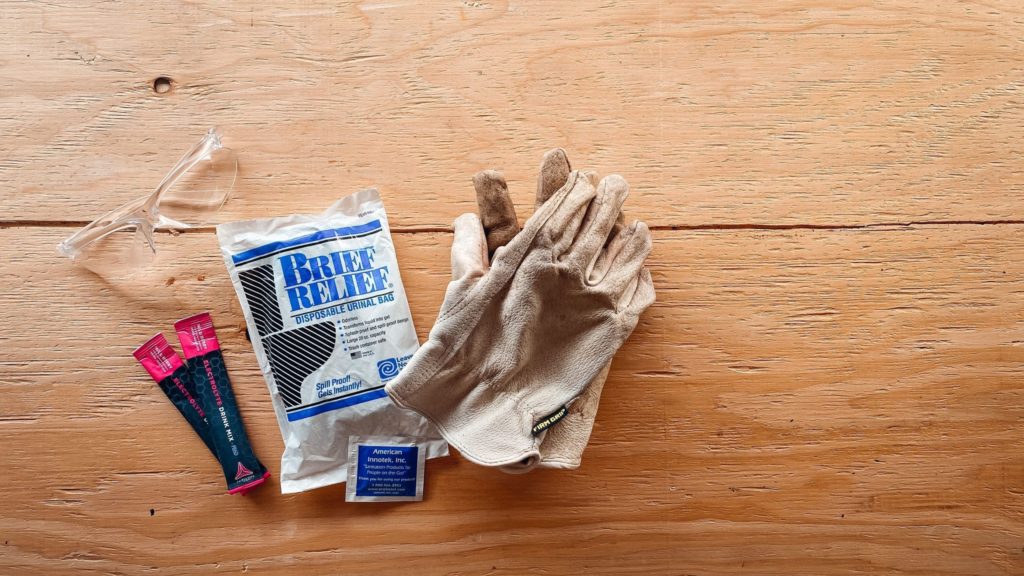
[vc_row][vc_column][vc_column_text]
In the age of this global COVID-19 pandemic, it is important for everyone to remain as healthy and hygienic as possible. While on the front line, first responders, FEMA & Red Cross workers, military personnel, utility and construction workers, and medical staff must interact with the general population. It is uncertain which individuals are infected with the coronavirus since not everyone shows symptoms. These brave individuals put themselves at risk in order to assist those in need. Brief Relief can keep things safe and sanitary and is the best choice when local facilities are unavailable.
During these long shifts, many of these personnel must utilize the closest restroom available. Rather than continuing to use local toilets that may or may not have been recently sanitized, Brief Relief products allow those on the front line to answer nature’s call in the most sanitary way possible and reduce the spread of COVID-19.
[/vc_column_text][vc_column_text]
Depending on the material of a toilet seat, stall handle, and sink knob, the COVID-19 virus can survive from a number of hours to a number of days in a public bathroom. While many facilities are doing all they can to keep conditions sanitary, personnel and staff cannot be certain if the bathroom has been recently cleaned or not. During grueling 12 hour or more days, it can be difficult for these brave individuals to find a safe and hygienic area to use the bathroom. By using public toilets, they put themselves at risk for contracting the very virus they are battling against.
Fortunately, Brief Relief products can be used in any setting and provide a hygienic method to relieve one’s self. The following products can help anyone in the hospital, FEMA & Red Cross sites, utility and energy sectors, and military response areas reduce the likelihood of contracting and spreading the virus from a public bathroom:
• Portable Toilet Waste Bags: Suitable for both liquid and solid waste, these disposable waste bags for portable toilets allow those on the front line to easily relieve themselves in nearly any environment. They can be used on their own or combined with a portable toilet.
• Commodes Systems and Toilet Seats: A commode is a practical solution to digging a latrine outdoors. Available with a riser and toilet seat for comfort, a commode mimics a traditional toilet. These systems should be combined with Brief Relief waste bags to ensure maximum hygiene.
• Privacy Shelters: Those who do not wish to complete their business with everyone watching can escape to a privacy shelter and relieve themselves with peace of mind. The shelter is easy to set up and repels water during storms. With an inner zipper and lock, responders do not have to worry about someone walking in on them.
[/vc_column_text][vc_column_text]
Additional products that FEMA & Red Cross workers along with first responders, military personnel, utility and construction workers, and medical staff can benefit from during the COVID-19 pandemic include disposable hand wipes, fluid tactical electrolyte mix, and heat relief towels. The wipes allow front line workers to remain hygienic even when no hand washing stations are available. They are biodegradable, which makes them perfect hygienic environmentally safe products! Fluid tactical electrolyte mixes come in a variety of flavors and replace all vital electrolytes at the same ratios as they are lost in sweat. The heat relief towels ensure those who are working stations outdoors do not experience heat stroke. It’s important to keep those on the front lines as safe and comfortable as possible!
Brief Relief products are designed with everyone in mind. Men and women who risk exposure to COVID-19 by utilizing public restrooms will find it is safer and more hygienic to use our environmentally safe products. Our disposable waste bags for portable toilets are approved to be thrown away in trash cans in any state or province. With the polymers and enzymes in our waste bags, urine and stool are biologically broken down to become safe for disposal. With a shelf life of 10+ years, you do not have to worry about any of our products breaking down throughout the COVID-19 pandemic.
If you have any questions or need assistance placing an order for your first responders team, please do not hesitate to contact us today! Those who are ordering on behalf of the U.S. Military are encouraged to contact Louis Ortego directly at (858) 354-5034 or lortego@restop.com.
[/vc_column_text][/vc_column][/vc_row]
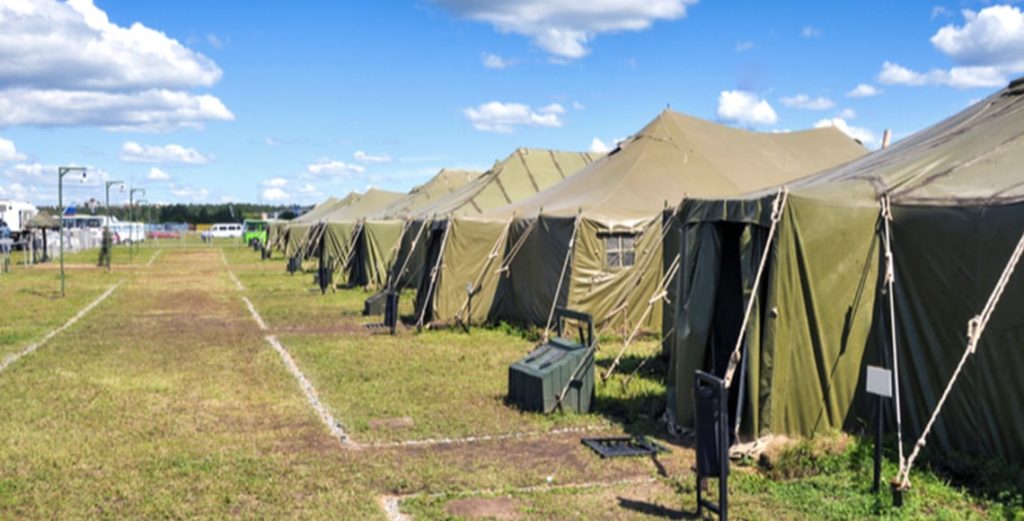
[vc_row][vc_column][vc_column_text]Not all forward operating bases (FOB) are the same. Smaller FOBs have limited services and resources with soldiers making do with the most basic equipment and facilities. There may be limited electricity, no hot showers, no running water, and no toilets that flush.
Daily life without plumbing for the army typically means using outhouses with sewage containment tanks. However, the problem with outhouses, porta-potties, or bathroom trailers is that they need regular servicing to prevent the spread of bacteria and disease.
Fortunately, there’s an alternative to outhouses that is not only more sanitary, less work to maintain, highly portable, but also more cost-effective. [/vc_column_text][vc_column_text]Benefits of Field Lavatory Systems over Porta-Potties
The Brief Relief Field Lavatory System is a portable sanitation system for soldiers living at an FOB or on the move. The whole system only weighs 18 lbs, making it easy to transport. It also takes no more than 2 minutes to deploy completely, and it can be set up virtually anywhere. Unlike the porta-potty or other types of outhouses, it requires no prep or servicing.
The field lavatory system includes a privacy tent, a commode with a full-sized toilet seat, and a supply of waste bags. Waste Bags use specialized gelling technology to create unique waste alleviating solution. Brief Relief portable waste bags are odor-free, puncture-proof, spill-proof, and landfill-safe. For added hygiene, the waste bags come with plenty of toilet paper and antimicrobial wipes.
Brief Relief waste bags change the composition of the waste, converting it into a deodorized gel. The waste bags contain a special formulation with a polymer component designed to contain and encapsulate the waste immediately. The enzyme component in the powder formulation accelerates the complete biological breakdown of urine and stool to its most basic parts. This process ensures the waste bag and its contents are safe for disposal in any regular trash receptacle.
The shelf life of an unused Brief Relief waste bag is virtually unlimited. It’s been tested by the U.S. military which rated the shelf life of the product at ten years plus. It is 95% active even after five years of storage. The portable waste bags are also ideal for each member of the army to store in their gear so they will always have a bathroom solution within reach.
The privacy tent is water repellent, non-conductive, and flame resistant; it meets CPAI-84 standards. To prove how durable the tent is, the Everest 98 Environmental Expedition tested them in extreme conditions for four weeks at 18,500 feet. The Brief Relief privacy tents endured below-freezing temperatures and intense heat exposure and radiation from the sun; the tents even survived a yak stampede.
The Field Lavatory System’s commode bucket will not crack or melt. It is manufactured from heavy-duty polyethylene; it boasts a thick wall to resist becoming brittle in extreme cold or soft in extreme heat. It uses the same material and build as buckets designed to store and transport hazardous chemicals safely. It even comes with a seat manufactured from industrial-grade polyurethane that also resists damage or degradation. For added comfort, the commode is the height of a regular toilet. [/vc_column_text][vc_separator][/vc_column][/vc_row][vc_row][vc_column][vc_column_text]
[/vc_column_text][/vc_column][/vc_row]
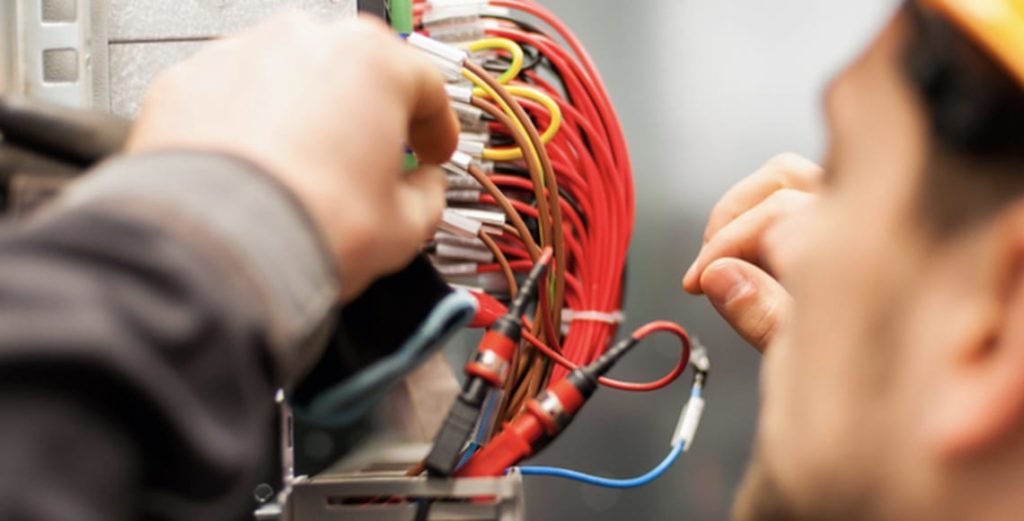
[vc_row][vc_column][vc_column_text]When electricians need to leave a job to find a bathroom, their days become longer. And when you add up all the time lost to bathroom breaks that require you to leave the job site in search of a running toilet, you realize how many service call opportunities may have been missed.
Evidently, this means lost profits.
The urge to relieve yourself can also be distracting, forcing you to lose focus on your work. Locating a neutral wire or analyzing the cause of a malfunction can take you all day. The last thing you need is the distraction that comes with not knowing where you can relieve yourself.
Emergencies also pop up all the time. Your day may involve going from one facility that has lost all power due to a blown transformer to heading to a residential home where an electrical malfunction needs to be contained. Diverting your attention to search for a bathroom may keep you from arriving at an emergency in time to prevent electrocution or fire. [/vc_column_text][vc_column_text]
By storing a personal lavatory system in your service van, you will always have a bathroom solution within reach. The Brief Relief Portable Lavatory System comes complete with a privacy shelter, commode, and supply of waste bags. Waste Bags use specialized gelling technology to create unique waste alleviating solution.
The whole system only weighs 18 lbs. The privacy shelter sets up and breaks down quickly; it comes with a carry case that makes storing it in the service truck easy. Its opaque gray fabric offers full privacy even in full sunlight conditions.
The portable commode comes with a full-sized flexible toilet seat. Because the commode is the size of a standard 5-gallon pail, it also stores away without taking up much space. The commode has also been weight tested, easily surviving a 300-lb test that lasted 12 hours.
Brief Relief’s patented waste bags come with safe polymers and enzymes that treat waste and convert them into a deodorized gel. The liquid waste bag holds up to 20 oz of urine while the Disposa-John handles both liquid and solid wastes. For added hygiene, the Disposa-John comes with ample toilet paper and antimicrobial wipes.
All Brief Relief products are made with non-toxic materials and conform to OSHA and EPA regulations. The portable waste bags are odor-free, puncture-resistant, spill-proof. Because Brief Relief waste bags are land-fill safe, you can throw them away in any regular trash can in any state or province.
As long as you properly use and seal the waste bags, there is no chance they will leak. The gel is self-sealing; the enzymes neutralize the waste by breaking down the waste into simple salts and water.
Brief Relief products are currently being used by the top 100 utility companies in the U.S. and Canada, municipalities, construction companies, government agencies, and the U.S. and Canadian militaries. In fact, some companies have been using Brief Relief products for almost twenty years. [/vc_column_text][vc_separator][/vc_column][/vc_row][vc_row][vc_column][vc_column_text]
[/vc_column_text][/vc_column][/vc_row]

[vc_row][vc_column][vc_column_text]When the Bureau of Land Management was formed more than 70 years ago, we didn’t know as much about the environmental impact of human waste left in the wilderness as we do today.
Today, we know that urinating or defecating closer than 200 meters from a water source can contaminate it. We also know now that the viruses in human excrement can survive for weeks at low temperatures as they wait for a new host. And, with global warming melting snow in areas that have remained frozen for generations, we now realize that the feces left behind didn’t break down and may resurface.
Managing public lands and resources to sustain their health and diversity is a huge responsibility that we all must contribute to today to help both the present and future generations. Because of limited resources, the BLM cannot clean up public lands entirely on their own. However, they can promote the best practices to help prevent the problem from growing and help restore the former beauty of these lands.
The BLM aims to educate all nature-lovers and visitors to public lands on how to be responsible with their waste. Squatting on the ground and relieving yourself in the wilderness should no longer be an option; it spreads disease-causing pathogens and diseases, harming wildlife, nature, visitors, and neighboring communities. [/vc_column_text][vc_column_text]
A sanitary solution for packing out waste when visiting public lands is available in the form of portable waste bags. Waste Bags use specialized gelling technology to create unique waste alleviating solution. They are safer than using porta-potties and outhouses, which are notorious for their stench and for being contaminated with bacteria and disease, particularly if they are overflowing and haven’t been serviced in weeks due to budget constraints.
The Brief Relief Liquid Waste Bag is designed for urine, while the Disposa-John is designed for both liquid and solid waste. The waste bag for liquid waste can handle a full 20 ounces of urine, making it ideal for long hikes and overnight trips in the backcountry. It has a wide opening with a semi-rigid rim, making it easy to use for both men and women.
The Disposa-John safely contains and neutralizes both liquid and solid human waste thanks to a patented gas-impervious triple-barrier bag design. For added hygiene, the Disposa-John comes with ample toilet paper and antimicrobial wipes that you can throw in the bag before cinching it shut and sealing it.
Brief Relief portable waste bags are odor-free, puncture-proof, and spill-proof. Both Brief Relief portable waste bags contain a sophisticated blend of polymers and enzymes that change the composition of the waste, accelerating its breakdown. The waste is encapsulated, eliminating odor in the process, and converted into a gel state.
Because all Brief Relief waste bags are puncture-resistant and spill-proof, you can roll the used bags up and safely store them in your backpack. Brief Relief waste bags are non-toxic and landfill-safe and can be disposed of in any regular trash can. [/vc_column_text][vc_separator][/vc_column][/vc_row][vc_row][vc_column][vc_column_text]
[/vc_column_text][/vc_column][/vc_row]
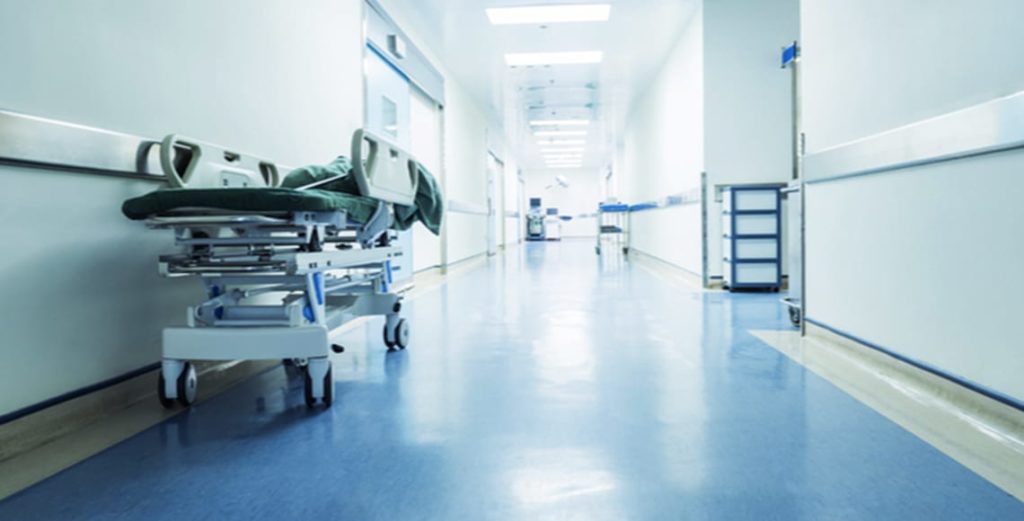
[vc_row][vc_column][vc_column_text]From urine to stool to vomit, human waste products come in different forms. In a typical setting, exposure to human wastes is hazardous enough as it spreads disease. It’s even more worrisome in hospitals where people are already sick, and their weakened immunities need to be kept in a sterile environment.
Waste bags can offer hospitals a more hygienic solution to the management of human waste, allowing them to keep hospital rooms clean for their patients and other attending staff. Waste Bags use specialized gelling technology to create unique waste alleviating solution.
Brief Relief Waste Bags contain sophisticated polymers and enzymes that transform human wastes into a deodorized gel. The waste bags are made with a sturdy triple barrier bag design and non-toxic materials that make them puncture-resistant, spill-proof, and odor-free. [/vc_column_text][vc_column_text]
Waste bags like the Brief Relief Liquid Waste Bag are ideal for hospital staff who help patients empty their catheter bag. Attempting to drain the bag into the toilet is challenging as it requires the patient to stand up and make the trip to the bathroom. In many cases, the patient may be unable to do so, and the nurse will need to drain the bag into a container which they will later empty into the toilet.
With a Liquid Waste Bag, there’s no need to catch the urine in a different vessel. The catheter bag’s drainage tubing can be positioned to allow the urine to drain directly into the waste bag. A waste bag can eliminate the process of collecting urine in a separate container or bedpan, which will need to be sanitized with bleach and water with every use.
With Brief Relief waste bags, the liquid wastes immediately activate the gelling process and eliminate the risk of spillage. Even if the waste bag is dropped on the floor by accident, the contents will not make a mess.
For emptying a colostomy bag, the Brief Relief Disposa-John is the solution. There’s also no need for the patient to walk all the way to the bathroom to drain their ostomy bag or potentially contaminate a separate container. The Disposa-John was designed to handle both liquid and solid wastes by using the same polymers and enzymes found in the liquid waste bag. The wastes are also converted into a deodorized gel.
For patients who may be prone to vomiting, particularly after surgery, Brief Relief waste bags can help hospital staff minimize the spread of disease and contamination. Instead of throwing up in a pail that may be left exposed and uncleaned for a while, patients may vomit in a waste bag that will convert the bile into a gel. The waste bag seals securely and will mitigate the risk of spreading bacteria.
Because all Brief Relief waste bags are made with non-toxic materials, they’re landfill-safe and can be thrown away in a regular trash receptacle. [/vc_column_text][vc_separator][/vc_column][/vc_row][vc_row][vc_column][vc_column_text]
[/vc_column_text][/vc_column][/vc_row]
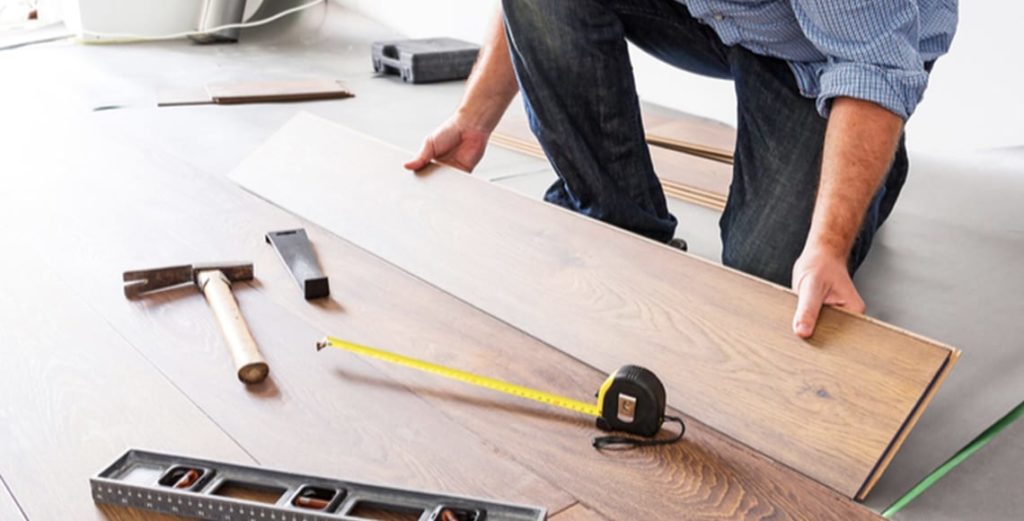
[vc_row][vc_column][vc_column_text]As a flooring installer working on different types of flooring in both residential and commercial buildings, you know the challenges of finding a bathroom when you need it.
In many cases, the building where you’re installing flooring is still under construction. The plumbing may not be installed or working yet. While there’s the option to use the construction site’s porta-potties, we all know that outhouses aren’t the most sanitary options as dozens of workers on the site share them. Also, they’re probably not very accessible as porta-potties have to be set up a distance away from the site, so as not to obstruct pathways for the crew and driveways for the trucks and heavy equipment.
Fortunately, there’s a solution that is sanitary, convenient, and most importantly, portable. The Brief Relief Portable Lavatory System is like carrying a personal bathroom stall. The system includes a privacy tent, portable commode, and a supply of waste bags. Waste Bags use specialized gelling technology to create unique waste alleviating solution.[/vc_column_text][vc_column_text]
If you’re in the middle of installing flooring and feel the urge to relieve yourself, you can skip the porta-potties. There’s no need to hold it in and put your bladder health at risk. You can also stop considering urinating behind a tree or bush and potentially getting in trouble with the law.
Instead, you can go to your truck and pull out the lavatory system; the whole system weighs only 18 lbs and packs away neatly. The privacy tent collapses and fits in a carry case while the commode makes a sturdy base to hold a full-size flexible toilet seat. It includes a tight-seal screw on gamma-lid to store and transport your sanitation supplies when out on a job.
You can set up the privacy tent right next to your truck. It is easy to set up and break down. Its opaque color guarantees complete privacy as does the zipper locks on the inside. For your comfort, the commode is the height of a standard toilet. Choose between the Brief Relief Liquid Liquid Waste Bag or the Disposa-John.
The Brief Relief Liquid Waste Bag can hold up to 20 oz. of urine, while the Disposa-John’s triple barrier design was made to seal both liquid and solid wastes safely. All Brief Relief waste bags contain a unique blend of polymers and enzymes that are activated by wastes, breaking them down and converting them into a deodorized gel. The waste bags are odor-free, puncture-resistant, and spill-proof. Because all Brief Relief products are made with non-toxic materials, they are landfill-safe and can be thrown away safely in a regular trash bin.
Alternatively, you can pack Brief Relief waste bags with you on-site. Even if the toilets in the commercial building or residential home aren’t fully functional yet, you can use them for privacy as you use a waste bag. Once you’re done, seal the bag shut and throw it away in any trash receptacle. [/vc_column_text][vc_separator][/vc_column][/vc_row][vc_row][vc_column][vc_column_text]
[/vc_column_text][/vc_column][/vc_row]
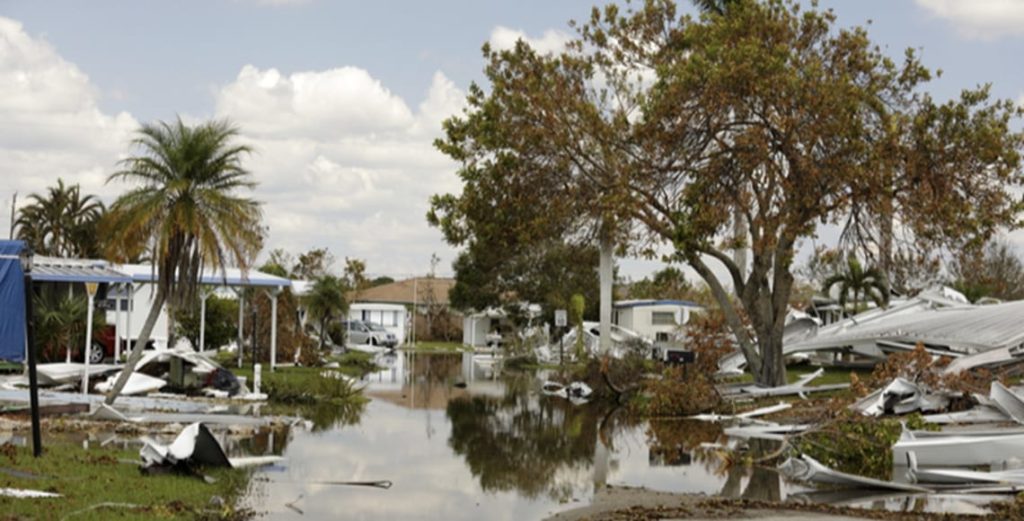
[vc_row][vc_column][vc_column_text]Hurricanes leave behind a lot of destruction, but they also leave us with valuable lessons and provide us with opportunities to train and prepare for the next one.
When preparing emergency preparedness kits, many have failed to identify one of the most basic human needs in times of disaster apart from clean water, food, and shelter; the need to use the bathroom. From first responders to volunteers and civilians, people need a restroom and with no running water after a hurricane, it’s not that simple.
But, here are some safe and sanitary solutions that allow people to always be prepared in the devastation that follows a hurricane. [/vc_column_text][vc_column_text]
While everyone else is evacuating, first responders mobilize, rush into the hurricane’s path to aid in disaster preparation and provide aid as quickly as possible. In the aftermath, flooding doesn’t only make it challenging for first responders to reach civilians trapped in their homes, but it also means no access to toilets.
With no accessible or functioning bathroom in sight, portable waste bags offer first responders a sanitary, convenient, and portable solution. Waste Bags use waste alleviation and gelling technology to fulfill sanitary toilet functions.
The Brief Relief Liquid Waste Bag is an individually packaged bag for urine while the Disposa-John is a triple barrier bag for liquid and solid waste. The liquid waste bag has a wide opening with a semi-rigid rim, which means both men and women can use it; its one-way valve prevents spillage.
For added hygiene, the portable waste bags include antimicrobial wipes. All Brief Relief waste bags contain a sophisticated blend of polymers and enzymes that break down and convert wastes into a deodorized gel. The portable waste bags are odor-free, puncture-resistant, spill-proof, and landfill-safe. [/vc_column_text][vc_column_text]
Because water is typically one of the first utilities to be shut off after a calamity, using the bathroom in an evacuation center or other shelters such as schools will not be an option – leaving porta-potties as the go-to bathroom solution to accommodate the community.
However, we have learned that overcrowding leads to health issues at evacuation centers. Living in such close proximity and the sharing of toilet facilities that may not be getting cleaned as often as they should ultimately can lead to the spread of disease.
Brief Relief offers a solution that is a more sanitary alternative to porta-potties that eliminates contamination and spread of viruses and bacteria.
The Brief Relief Portable Lavatory System comes complete with a privacy shelter, commode, and supply of waste bags. Unlike the porta-potty, a portable lavatory system doesn’t need to be serviced. Because roads may be inaccessible after a hurricane, trucks may not be able to remove out the sewage from the porta-potties’ collection tanks regularly.
With the portable lavatory system, you will have privacy and a commode that is the height of a regular toilet. Because all Brief Relief waste bags are non-toxic and landfill-safe, they’re safe to dispose of in any regular trash can. [/vc_column_text][vc_separator][/vc_column][/vc_row][vc_row][vc_column][vc_column_text]
[/vc_column_text][/vc_column][/vc_row]
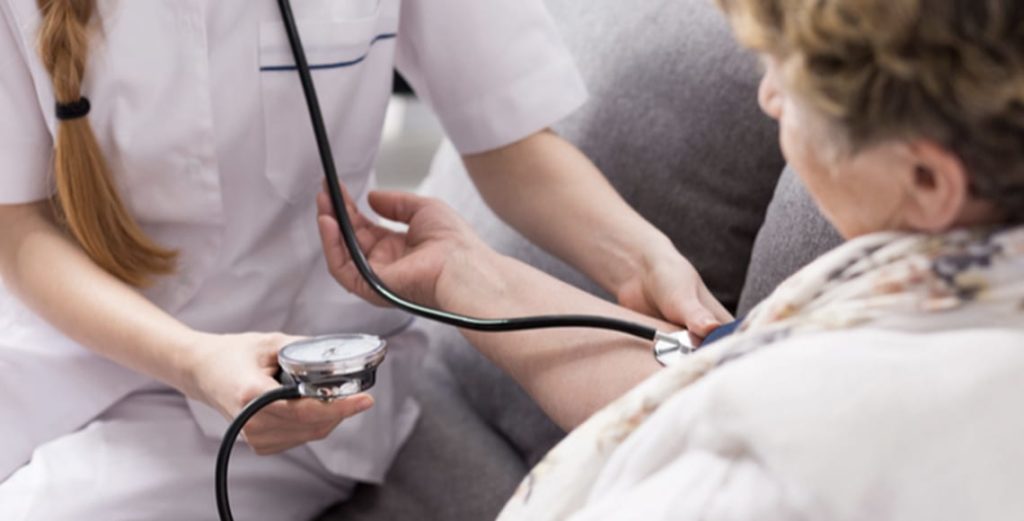
[vc_row][vc_column][vc_column_text]More and more hospitals now offer private duty care to patients who, once discharged from the hospital, need assistance at home. Most patients who need home care are elderly, special needs, injured, or recovering from major surgery. They will need help with taking their medication, caring for their wounds, or monitoring their IV.
Because patients will have limited mobility or may be bedridden, personal care attendants will likely assist with a roster of daily activities, and the bathroom needs of a patient are probably not the most glamorous. Depending on the patient’s needs, the private duty care nurse’s role will involve helping patients to the toilet, assisting them with a bedpan, emptying a drainage bag, or changing diapers.
Because of all the medication patients take, their urine and feces may be infectious or contain toxic medicine residues. Therefore, soiled diapers and bedside containers that collect urine and feces may have traces of infectious microorganisms and may be hazardous to the attending nurse and anyone who lives in the patient’s home.[/vc_column_text][vc_column_text]
Waste bags offer nurses a better waste management solution that is safer and limits the spread of disease. Waste Bag is an industry standard term that stands for ‘Waste Alleviation and Gelling Bag.’ Because of the waste bag’s triple barrier bag and liner design, the bags are odor-free, spill-proof, and puncture-resistant. They’re landfill-safe and can be disposed of in any regular trash receptacle.
Waste bags will convert urine, feces, or vomit thanks to its special blend of polymers and enzymes. Once the wastes are converted into a gel and the bag is closed shut, any bacteria or residual medicine toxins will be sealed in. They will also seal in the odor, keeping the patient’s home smelling cleaner and free of the smell of human waste.
With waste bags, patients don’t need to be assisted or carried to the toilet whenever they need to use the bathroom. They’re also less messy than bedpans. With waste bags, the waste activated gelling works as soon as the waste hits the inside of the bag. With bedpans and drainage bags, there’s a risk of spillage when removing the bedpan, emptying the drainage bag, and transporting the waste to the toilet for disposal.
The Brief Relief Liquid Waste Bag was designed for men and women; it has a wide opening with a semi-rigid rim to prevent spills. The Brief Relief Disposa-John handles both liquid and solid waste and contains waste activated gelling.
While Brief Relief waste bags are used for urinary and fecal discharge, they’re also ideal for patients who suffer from nausea and vomiting after surgery. Instead of keeping a pail by the bed to catch vomit, personal caregivers can assist patients in throwing up in a waste bag that will instantly convert the vomit into a deodorized gel. It’s a time-saver as using a bucket requires you to rinse it out with every use to prevent the spread of disease and to keep the smell from lingering.[/vc_column_text][vc_separator][/vc_column][/vc_row][vc_row][vc_column][vc_column_text]
[/vc_column_text][/vc_column][/vc_row]
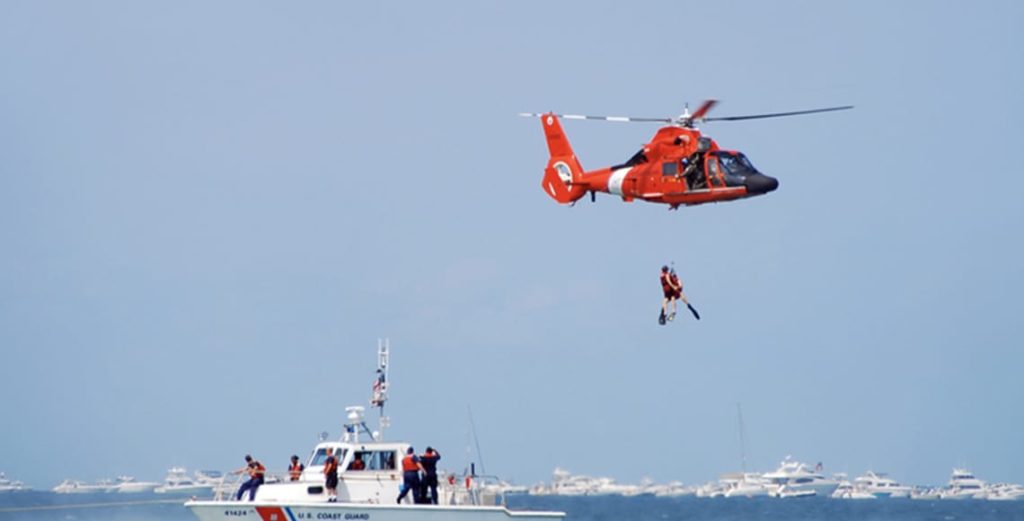
[vc_row][vc_column][vc_column_text]While the Coast Guard is considered a Military service, it does not fall under the Department of Defense. From responding to oil, biological, chemical, and radiological spills in the marine environment to the search and rescue of both military and civilians at sea, the Coast Guard needs to be prepared at a moment’s notice when they’re called out.
While the Coast Guard’s roles are focused on maritime safety and security, the Coast Guard operates more than just water vessels; they also use aircraft like helicopters, meaning workers may find themselves on a boat or high up in the air when responding to a call.
Coast Guardsman go through rigorous training to prepare for sea and air travel; however, the civilians they rescue do not. The people they save will feel weak and disoriented, mainly if they’ve been out at sea for hours or days. Flying in a chopper or traveling by boat makes even healthy people nauseous; imagine what it will do to someone who has been injured, exhausted, and weakened by an accident or emergency at sea.[/vc_column_text][vc_column_text]
By storing waste bags on Coast Guard aircraft, helicopters, and boats, Coast Guardsman will always be prepared to attend to the needs of the people they rescue. Waste Bag is an industry standard term that stands for ‘Waste Alleviation and Gelling’ Bag.
While waste bags were originally designed for human waste, the bags are just as effective at managing vomit. Rather than vomiting over the side of the boat into the water, waste bags give people a more dignified way of throwing up. It also lessens the chances of someone falling overboard.
There are also no lavatories in Coast Guard aircraft and helicopters; therefore, a passenger who suffers from air sickness cannot throw up in a sink or toilet onboard. The best solution is to vomit in a waste bag which doesn’t require them to stand up and move about the aircraft. Survivors of rescue operations may be injured or too weak to move about the plane anyway.
Waste bags work much better than regular barf bags, which are no more than a paper bag with a plastic lining. Unlike waste bags, they’re not spill-proof, odor-free, or puncture-resistant. Brief Relief waste bags use a triple barrier bag for liquid and solid waste, including vomit. They contain a blend of polymers and enzymes which convert wastes into a deodorized gel. Because Brief Relief waste bags are made with non-toxic material, they are landfill-safe and can be disposed of in any regular trash can.
Brief Relief waste bags should be stored in every Coast Guard watercraft, aircraft, and land vehicles. As mentioned, waste bags were primarily designed to handle liquid and solid wastes; however, because Brief Relief waste bags are made using unique polymers and enzymes and made of durable material, they serve more than one purpose. [/vc_column_text][vc_separator][/vc_column][/vc_row][vc_row][vc_column][vc_column_text]
[/vc_column_text][/vc_column][/vc_row]
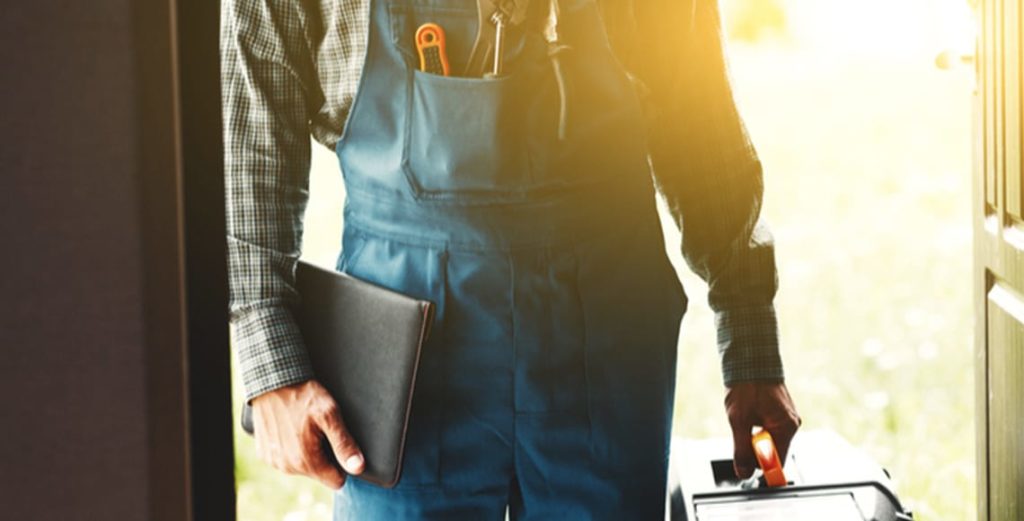
[vc_row][vc_column][vc_column_text]The irony of being a plumber is that even though you’re at a homeowner’s house fixing a broken toilet flush, you probably won’t be allowed to use that same toilet once you get it working again.
Part of being a plumber is accepting and respecting the client if they have a rule against letting outsiders use their private bathroom. And, even if they don’t have a problem with you using the bathroom, you still might not because the water is turned off, the toilet hasn’t been set up, or the toilet is still broken. As a plumber, you know that running water and plumbing are what make toilets sanitary. It’s probably why you probably avoid porta-potties at all costs.
So, what’s a plumber to do when they’re on the job and nature calls? One option is to stop what you’re doing, tell the client you have to leave for personal reasons, and get into your truck to find the nearest gas station. Another option is to pee next to your truck and risk getting a ticket from the police for indecent exposure or get sued by the homeowner or their neighbors.[/vc_column_text][vc_column_text]
Brief Relief offers a solution that is not only portable but sanitary. The Brief Relief Porta-Quick Utility System comes complete with a privacy shelter, portable commode, and supply of waste bags. Waste Bag is an industry standard term that stands for ‘Waste Alleviation and Gelling’ Bag.
When you bring the portable lavatory system with you on a job, there’s no reason to travel to look for a running toilet, hold it in, or risk getting in trouble with the law by urinating where you shouldn’t.
The privacy shelter sets up in a snap and provides complete personal privacy at any worksite. You can easily store it in your truck or trunk. It’s water repellant, fire-retardant, non-conductive and comes with a carry case. For your comfort, the portable commode is the height of a regular toilet. If you want a comfortable toilet seat, the Fliptop seat is a snap-on toilet seat is made of rugged HDPE plastic.
The system comes with a supply of waste bags that contain a unique blend of polymers and enzymes that convert wastes into a deodorized gel, making them odor-free. There’s no mess or fuss as because all of the waste goes into the waste bags for easy disposal at a later time. Because they’re non-toxic and the bags are puncture-resistant, they’re safe to throw away in any regular garbage bag.
As a plumber who makes a living installing and repairing toilets, it may seem strange to use anything else when you need to poop or pee. However, when you’re on the job, and there’s no running toilet available to you, you’ll agree that a portable lavatory system is the best solution.[/vc_column_text][vc_separator][/vc_column][/vc_row][vc_row][vc_column][vc_column_text]To find out more about what Brief Relief has to offer workers in unique job environments, please visit our shop.[/vc_column_text][/vc_column][/vc_row]

[vc_row][vc_column][vc_column_text]All Airmen undergo military training which prepares them for the physical and mental challenges of military life. During their 5-week training, they learn how to push their limits, work in dangerous environments, and survive without the everyday comforts of civilian life. Some of these luxuries include electricity, running water, and working toilets. [/vc_column_text][vc_column_text]
While military aircraft were built to carry many people, they weren’t designed with the same comforts as commercial planes. After all, the purpose of these planes includes rescue, transportation of soldiers into battle, or supply delivery. Don’t expect to find comfortable reclining seats or private lavatories onboard.
Airmen, despite their rigorous training and skills, are still very human and will naturally feel the urge to pee like the rest of us, even while in route.
Rather than ignore the call of nature or turn the aircraft around just to find a running toilet, Airmen should always find a way to relieve themselves and avoid holding it in. If they don’t, the distraction and discomfort may be enough to keep them from performing their jobs effectively, causing lapses in judgment and loss of focus that could impact the outcome of the mission.
By packing waste bags with the rest of their gear, Airmen have a sanitary bathroom solution within reach. Waste Bag is an industry standard term that stands for ‘Waste Alleviation and Gelling’ Bag. Waste bags are also more effective than regular barf bags.
Because Airmen fly out in all weather conditions, flights may be turbulent and cause passengers and even pilots to feel sick enough to vomit. They are also expected to fly out in a moment’s notice and need to be up in the air despite feeling unwell or right after a big meal, causing them to feel queasy midflight.
Brief Relief waste bags are just as effective at converting urine into a deodorized gel as they are with vomit. Conventional airline vomit bags are nothing more than paper bags with a plastic inner lining. They don’t close securely very well and can still pop open. You can also still hear the vomit sloshing around inside. And, regular barf bags also aren’t great at concealing odors either.
The Brief Relief Liquid Waste Bag contains a patented blend of polymers and enzymes that convert urine and vomit into a deodorized gel that’s approved for disposal in any garbage container. They are odor-free, puncture-resistant and spill-proof. It’s made with a thick plastic bag that is sturdy and prevents the flow of bacteria. [/vc_column_text][vc_separator][vc_column_text]
Brief Relief’s patented bags come with safe chemicals that treat waste. Brief Relief also offers portable commodes and privacy shelters, providing employees with a private bathroom that can easily pop up and be taken down wherever they need it.
[/vc_column_text][/vc_column][/vc_row][vc_row][vc_column][vc_column_text]
[/vc_column_text][/vc_column][/vc_row]
[vc_row][vc_column][vc_column_text]Earthquakes can strike without warning and cause widespread devastation within minutes. They cause injuries, fatalities, and destroy residential and commercial structures. And, depending on the level of destruction, hundreds of thousands of people could be without running water and electricity. FEMA (Federal Emergency Management Agency) has been responding to disasters in the U.S., such as earthquakes, since its inception more than 40 years ago.
When disaster strikes, first responders need to act quickly. They need to plan the delivery of first aid supplies, water, and medicine. Displaced residents need resources and guidance to shelters. FEMA will also coordinate with the Red Cross to assess the allocation of supplies and medicine for survivors with immediate needs.
Earthquake responders work around the clock to ensure all those impacted get the relief they need to prepare for long-term recovery. Logistical bottlenecks keep them from responding quickly, making response efforts go on for days or weeks.
At some point, FEMA and Red Cross workers also need to respond to their own biological needs, which means finding a bathroom to relieve themselves. [/vc_column_text][vc_column_text]
Brief Relief knows all about the demands and working conditions of emergency responders. The urge to pee or poop can happen anytime, anywhere. It doesn’t matter if you’re in the middle of delivering relief goods or transporting residents from their homes to a shelter, you shouldn’t ignore the need to go to the bathroom for long.
First responders may find themselves in areas where the water and electricity are shut off, making the nearest toilets unusable and challenging to locate in the dark. More so, the earthquake may have even damaged buildings entirely, leaving them unsafe to enter.
With Brief Relief waste bags, first responders will always have a sanitary bathroom solution within reach. Waste Bag is an industry standard term that stands for ‘Waste Alleviation and Gelling’ Bag. The Disposa-John waste bag has a triple-layer barrier bag design that contains a patented blend of polymers and enzymes that convert liquid and solid wastes into a deodorized gel.
All Brief Relief waste bags come with toilet paper and antimicrobial wipes for added hygiene. They’re puncture-resistant, odor-free, and spill-proof, making them ideal for packing with the rest of your gear. You can throw them away in a normal trash receptacle because they’re non-toxic and landfill-safe; however, since it will be challenging to find a disposal site, the waste bags are also impact-resistant and sturdy enough to pack out in your bag. You don’t have to worry about the waste bag popping open and spilling its contents. [/vc_column_text][vc_separator][vc_column_text]
Brief Relief’s patented bags come with safe chemicals that treat waste. Brief Relief also offers portable commodes and privacy shelters, providing employees with a private bathroom that can easily pop up and be taken down wherever they need it.
[/vc_column_text][/vc_column][/vc_row][vc_row][vc_column][vc_column_text]
[/vc_column_text][/vc_column][/vc_row]

[vc_row][vc_column][vc_column_text]Imagine getting a bird’s eye view of the New York skyline, Grand Canyon, the Sydney Opera House, or Victoria Falls.
There’s something magical about helicopter rides. They give passengers a spectacular view of the city or the countryside, allowing people to take in all the scenery and gain a unique perspective that you would never get on the ground.
But while helicopter rides can be a lot of fun, many people may not realize how different they are from commercial airplane flights. First of all, landing and take-off aren’t as smooth. In fact, many compare helicopter rides to roller coaster rides with their ups and downs, swooping motions, and vibrations.
Because of the sudden altitude changes on helicopter rides, many people experience motion sickness. Disorientation and nausea can hit passengers suddenly. And before you know it, a guest on your helicopter looks like their stomach is lurching and they keep swallowing as their mouth fills with saliva.
At this point, you know its time only a matter of time before they throw up. The smell of vomit is the last thing you want to fill the small, confined space of the inside of a helicopter, mainly if there are other passengers onboard. The pungent odor of puke is enough to create a chain reaction and lead others to feel sick, even those who aren’t prone to motion sickness.[/vc_column_text][vc_column_text]
As the owner or pilot of the helicopter, you may think that an airsickness bag like the ones they provide commercial airline passengers is enough. However, the problem with conventional vomit bags is that they’re nothing more than a plastic-lined bag.
They don’t give you peace of mind as the only way to close them is by folding the opening down. Because the bags are made of plastic, paper, or card, they’re not puncture-resistant or leak-proof. You can even hear the vomit sloshing around in the bag, making anyone nervous that the contents could easily spill out.
Also, puking into a traditional motion sickness bag doesn’t eliminate the smell. The awful smell of vomit still lingers, potentially triggering sickness in the other passengers.
By bringing wag bags on every flight, you have a better solution for passengers who struggle with airsickness. WAG Bag is an industry standard term that stands for ‘Waste Alleviation and Gelling’ Bag.
Brief Relief wag bags were designed to convert wastes into a deodorized gel, including vomit. The Disposa-John contains a polymer component that immediately contains and encapsulates the vomit. You don’t have to worry about the disgusting smell or the sound of vomit slopping around in a flimsy bag.
Unlike an ordinary barf bag, the Disposa-John has a triple barrier bag and liner that seals completely shut; it’s sturdy and spill-proof. Brief Relief waste bags have even survived drop tests from heights that would burst a conventional barf bag open on impact.
Because all Brief Relief wag bags are made from non-toxic materials, they’re landfill-safe and can be thrown away in any trash receptacle.[/vc_column_text][vc_separator][/vc_column][/vc_row][vc_row][vc_column][vc_column_text]Check out our Portable Waste Bags and find out why you should never take a flight without them.[/vc_column_text][/vc_column][/vc_row]
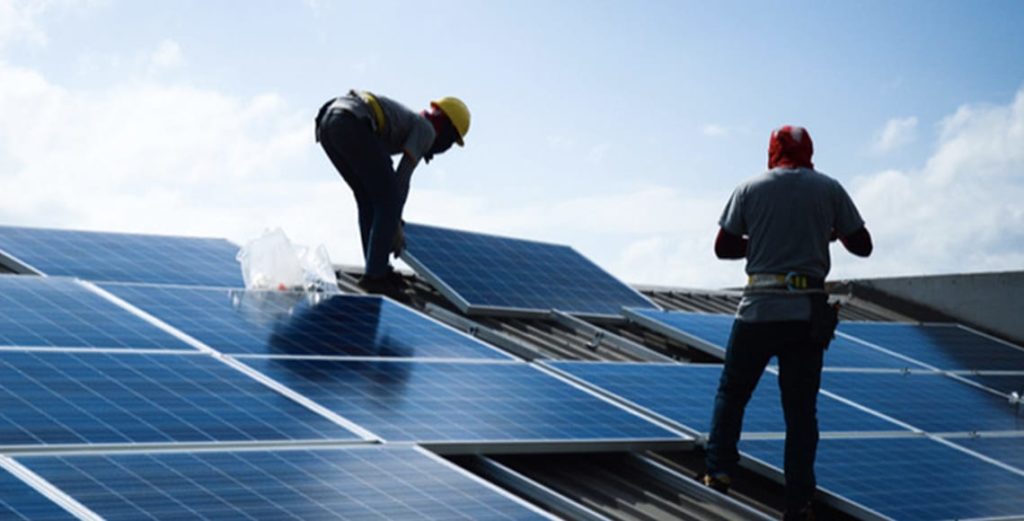
[vc_row][vc_column][vc_column_text]Life as a solar photovoltaic (PV) systems installer can be physically demanding as it involves carrying power tools and solar panels and multiple trips up and down a ladder to reach the roof. Because finding optimal placement is critical, it also typically means working on a hot, sunny day.
The job involves ensuring efficient installation and electrical configuration by measuring, cutting, assembling, installing, and maintaining solar modules following codes and standards. Therefore, work as a solar installer could mean long days.
At some point, nature will call, and you will have to make another trip down the ladder. But what if the homeowner says you can’t use their facilities for personal reasons or the nearest bathroom at a gas station is a drive away?[/vc_column_text][vc_column_text]
Solar PV installers typically work as part of a team; when one member has to stop work to go to the bathroom, the whole team may have to pause and wait for them to do their business. If the nearest running toilet is a walk or a drive away, this means no work gets done until that person returns.
Now imagine if this happens each time someone on the team needs to pee or poop. Do the math, and you’ll discover how much time and money you’re losing to bathroom breaks because workers have to travel so far to find a running toilet.
By keeping a portable lavatory system in your truck, your crew will always have a restroom at hand. With the Brief Relief Lavatory System, your team has a privacy shelter, a commode, and a supply of portable Waste Bags.
Knowing you don’t have to not only climb down from the roof but leave the job site just to find the nearest bathroom allows your team to concentrate on the job, increasing productivity, and minimizing downtime.
Having a portable bathroom system on hand also helps eliminate any legal issues created by someone on your team who relieves themselves where they shouldn’t. A member of your group may think no one’s looking when they sneak into the homeowner’s backyard and urinates in a corner. All it takes is a call to the authorities from a neighbor who happens to be looking out the window at that exact moment.
When you bring your own bathroom solution, there’s no need to ask the homeowner if you can use their facilities and no need to leave the site to find the nearest bathroom. And there’s absolutely no need to pee or defecate on the client’s property and put your company’s reputation at risk.
The privacy shelter sets up in a snap. When you need to go, line the commode with a Disposa-John Waste Bag and do your business as you normally would. Once you’re done, remove the waste bag and seal it closed. Because all Brief Relief Waste Bags feature a triple bag design and are made of non-toxic materials, they’re leak-proof, puncture-resistant, and safe enough to throw away in any regular trash can.[/vc_column_text][vc_separator][/vc_column][/vc_row][vc_row][vc_column][vc_column_text]Check out our Portable Lavatory Systems to find out how Brief Relief Lavatory Systems help your solar PV crew time and money.[/vc_column_text][/vc_column][/vc_row]
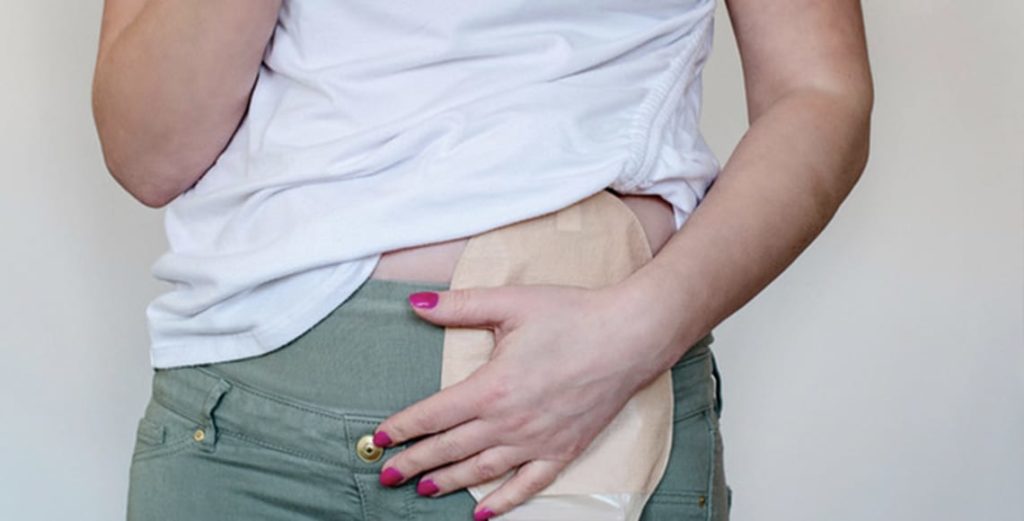
[vc_row][vc_column][vc_column_text]After a colostomy, most patients stay in the hospital for 3 to 7 days, with some staying longer if the procedure was done because of an emergency such as injury to the colon or rectum. While in the hospital, the staff helps the patient empty their colostomy bag regularly.
But what happens when you return home from the hospital and have to take care of yourself?
Because of the pain from the wound, it may take several weeks for you to return to your routine and back to enjoying your normal activities. Something as simple as coughing or sneezing may cause pain and fear that your incision will open up.
However, healing from the procedure is one thing – what about getting used to the colostomy bag that collects waste from your body?
While colostomy bags or stoma bags are quite common and are not painful, it does involve a change in lifestyle. After all, you now have a bag that allows your waste to bypass the colon. Adapting to the pouch may take a while getting used to emptying the colostomy bag is where most people need the most direction.
For obvious reasons, there’s a certain eew factor to overcome. Not only do you now have to walk around with a bag that contains your wastes, but you have to drain the pouch regularly.
If you have a drainable pouch, it’s simple enough to empty the bag into a toilet. At some point, you will get used to it and discover a technique that works for you. But what if there isn’t a running toilet anywhere nearby?[/vc_column_text][vc_column_text]
Your doctor will likely recommend that you empty your bag when it’s between 1/3 and ½ full; this means at some point, you may have to empty your pouch as often as you went to the bathroom before your surgery.
Therefore, peeing three times a day or pooping once a day means emptying your bag multiple times a day. The thought of having to drain your colostomy bag that often may be enough to make you think you have to give up outdoor activities that may take you away from running toilets for hours.
However, life with a colostomy bag doesn’t mean you have to slow you down. You don’t have to give up your favorite activities or worry about being miles away from a running toilet. Emptying your colostomy pouch can be as easy as draining its contents into a portable Waste Bag and going on with the rest of your day.
The Brief Relief Disposa-John waste bag is a triple carrier bag that contains a unique blend of polymers and enzymes that break down both liquid and solid wastes and convert them into a deodorized gel. Once you’re done emptying your colostomy pouch contents into the Disposa-John, you can seal it closed and throw it away in any regular trash can.[/vc_column_text][vc_separator][/vc_column][/vc_row][vc_row][vc_column][vc_column_text]
[/vc_column_text][/vc_column][/vc_row]
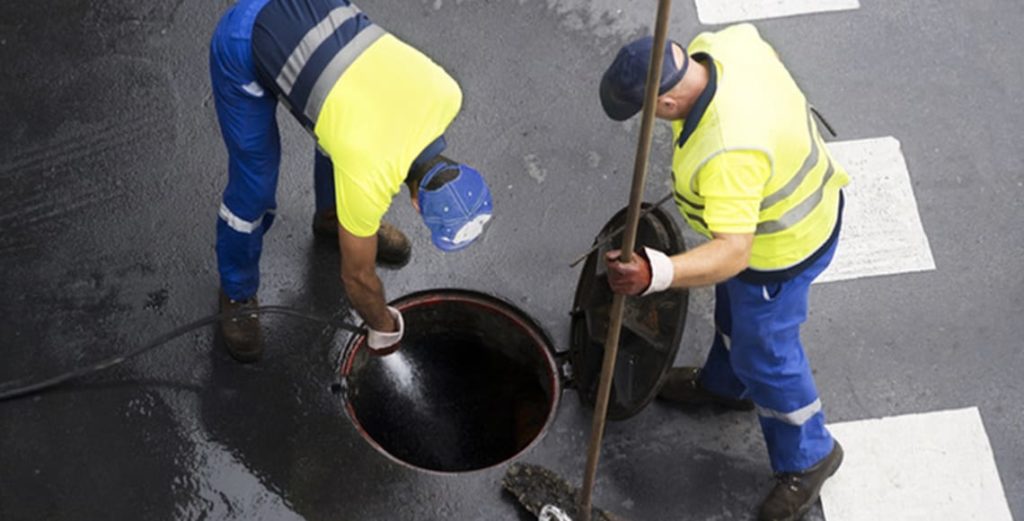
[vc_row][vc_column][vc_column_text]From fire hydrant maintenance to performing water and sewer excavations to responding to emergencies, a day in the life of a water and sewer utility tech means work assignments that take them to all the areas that the utility services.
Because water and sewer utility workers maintain, construct, and repair water distribution and sewer collection systems, technicians will find themselves performing location work in response to customer and contractor requests.
Water and sewage utility crews also respond to emergency calls during situations such as severe weather. It means they may have to participate in rotating on-call schedules or after-hours. Therefore, the job could mean long hours on the road or on-call with no guarantee when their day is over.
Because of the on-location demands of working in water and sewer utilities, a question that many who are interested in joining the utility workforce wonder is how technicians answer the call of nature when they’re on the job or the road, with no accessible bathroom nearby.[/vc_column_text][vc_column_text]
Whether you’re operating a mini excavator, service truck, jackhammer, pipe saw, sewer cleaning truck, the sudden urge to go to the bathroom means stopping work and leaving the vehicle or power equipment unattended while you find the nearest bathroom to relieve yourself.
The urge to pee or poop while on the job can be distracting, especially when you don’t know how far you have to travel to find a running toilet. And even if there’s a restroom at a nearby gas station, there’s no guarantee it will be one you’ll want to use.
Because access to clean facilities is a challenge for water and sewer utility techs on the job, Brief Relief created a solution that is portable and sanitary. Brief Relief portable Waste Bags contain a unique blend of polymers and enzymes that work on converting wastes into a deodorized gel. Brief Relief portable Waste Bags have a triple barrier bag and liner design that is non-toxic and safe enough to throw away in any regular trash receptacle after use.
For added comfort, you can also use the portable Waste Bags with the Brief Relief Commode; it’s the height of a standard toilet and comes with a full-sized toilet seat. For privacy, you can also complete the portable lavatory system with a Brief Relief privacy shelter that sets up and folds away in minutes. Because it comes with its own carry case, it packs away nice and neat in the utility truck. You can also store your unused wag bags in the Commode as it’s the size of a standard bucket, making it easy to keep in the utility truck and bring anytime you’re on-call or performing location work.[/vc_column_text][vc_separator][/vc_column][/vc_row][vc_row][vc_column][vc_column_text]
[/vc_column_text][/vc_column][/vc_row]
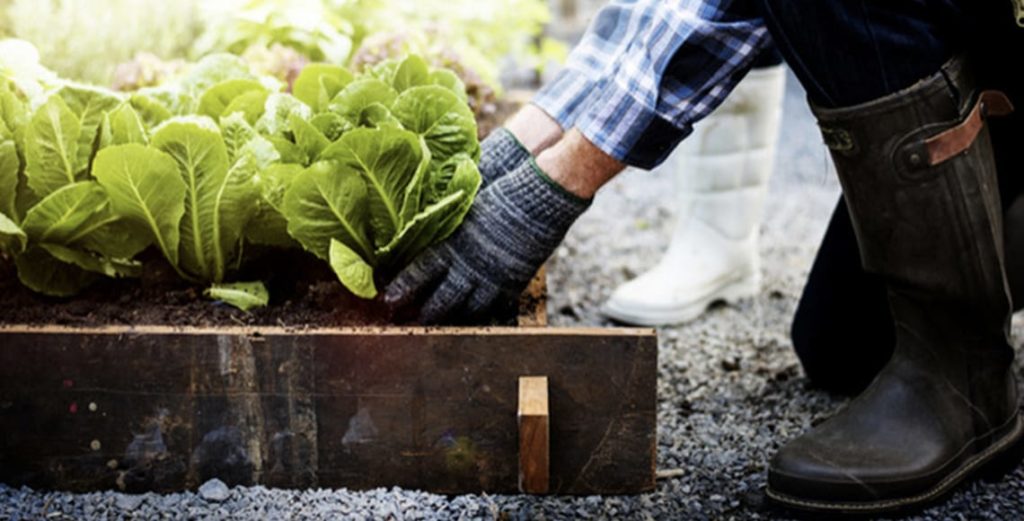
[vc_row][vc_column][vc_column_text]Landscaping crews try to prepare for their long day ahead as much as possible. Because they can never assume if their clients will allow them to use their restrooms, landscapers typically make bathroom stops at fast food joints or gas stations before going to the client’s house.
However, the urge to use the bathroom can hit us when we least expect it. Maybe what you had for breakfast didn’t agree with you or that big dinner has finally passed through your system. It can happen when we’re on the road or in the middle of our workday. You could be installing a sprinkler system, pulling weeds, or working manure into the soil.
Stopping your work to go find the nearest bathroom is terrible for productivity, especially if the nearest gas station or restaurant is miles away. Because the need to pee or poop can be unpredictable and facilities on-site aren’t always accessible, landscaping crews need to make their bathroom arrangements.[/vc_column_text][vc_column_text]
With a portable Commode and Waste Bag, there’s no need to put the client in the uncomfortable position of having to decide if they should let your crew use their private bathrooms. Bringing your Portable Lavatory System also helps prevent work stoppage because you always have bathroom facilities within reach.
A supply of Waste Bags come with the Brief Relief Commode system which also includes a full-sized seat. For added privacy, you can use the Commode inside a privacy tent.
The Brief Relief Privacy Enclosure provides users with a large, sound-reducing enclosure built to provide maximum privacy and comfort. It’s constructed from flame-resistant PVC with integrated spring locking fiberglass poles. The enclosure’s side panels conform to OSHA noise-reduction standards and reduce sound by 3-5 decibels from inside and out.
The client can advise gardeners and landscaping crews where it’s best to set up their lavatory systems; clients often don’t mind if you place your enclosure and commode on their property, as long as it doesn’t block any driveways or walkways. For obvious reasons, it’s best to put your lavatory system somewhere that’s not too exposed. A private spot in the backyard usually works best. Because the privacy enclosure also comes with a detachable floor that protects from rough or wet terrain, you can set it up just about anywhere.
Because the commode is the height of a standard toilet and full-sized seat, it’s comfortable to use. It’s been tested to withstand 300 lbs. of pressure. Line the commode with the Disposa-John; the Brief Relief Waste Bag that was designed to handle both liquid and solid waste. The triple barrier bag and liner contain a unique blend of polymers and enzymes that work to convert human waste into a deodorized gel.
After use, remove the waste bag from the commode, and seal it shut. Because all Brief Relief products are from non-toxic materials, the wag bags are landfill-safe and can be thrown away in a regular trash can. Each waste bag even comes with ample toilet paper and antimicrobial wipe for added sanitation.[/vc_column_text][vc_separator][vc_column_text]
Brief Relief’s patented bags come with safe chemicals that treat waste. Brief Relief also offers portable commodes and privacy shelters, providing employees with a private bathroom that can easily pop up and be taken down wherever they need it.
[/vc_column_text][/vc_column][/vc_row][vc_row][vc_column][vc_column_text]
[/vc_column_text][/vc_column][/vc_row]
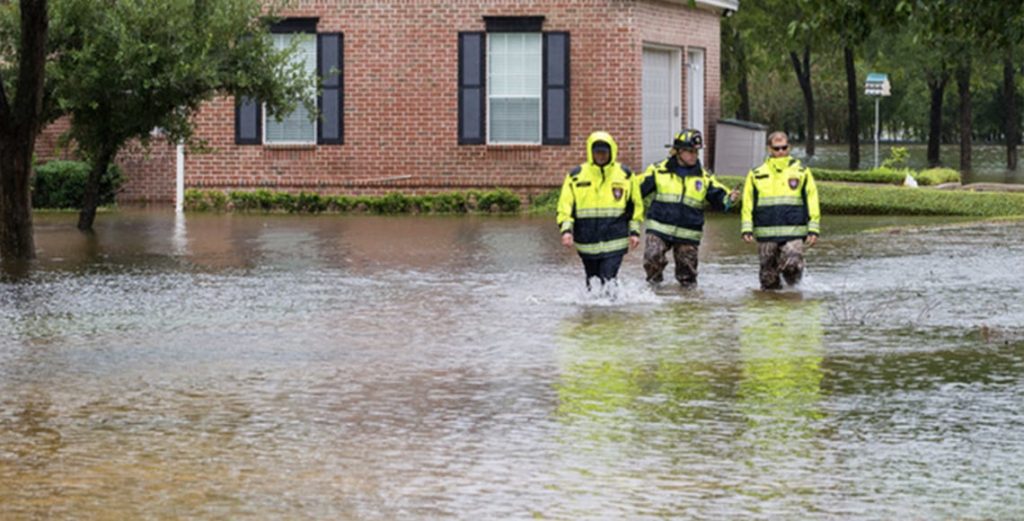
[vc_row][vc_column][vc_column_text]In the aftermath of a storm, there’s no knowing how long response and recovery operations will take. Unfortunately, not everyone may evacuate in time and find themselves stranded because of the flooding. Going house to house in search of people who need help may take days.
Depending on how severe the flood is, navigating the roads could be impossible. Driving during flood conditions is dangerous; two feet of moving water is powerful enough to sweep a car away while six inches of water is enough to stall smaller cars. Crossing a flooded area on foot is just as dangerous, as fast water can quickly sweep you away.
In completely flooded areas, boats may be required to reach homes submerged in water to rescue residents trapped inside. And, because boats can only carry so many people at a time, multiple trips may be required to get everyone to safety.
Even when the water has receded, the work may continue as search and rescue operations may turn into search and recovery, along with medical support, restoration, and cleanup. Because flood response activities could mean long hours or days on call, first responders will inevitably need to use the bathroom.[/vc_column_text][vc_column_text]
During a flood, treatment plants and sewers overflow and untreated sewage spew its way into the waterways. When human waste contaminates water systems, infectious bacteria such as E. coli, salmonella, tetanus, and Staphylococcus can spread. The last thing anyone should be doing during a flood is contributing to that problem by disposing of their wastes directly in the flood waters.
By packing portable Waste Bags along with the rest of their gear, flood first responders don’t need to worry about finding a running toilet amidst all the chaos.
The Brief Relief Disposa-John Portable Restroom is a triple barrier wag bag designed for liquid and solid waste. All Brief Relief products are designed to withstand travel, making them ideal for first responders on a call. Each bag contains a unique blend of polymers and enzymes deodorize and work to convert the waste into a gel.
Brief Relief Waste Bags are easy to use. You can either use them to line the inside of a commode or on their own. Once done doing your business, seal the bag shut. For added sanitation, each waste bag contains toilet paper and antimicrobial wipe which are also safe to throw in the Wag bag when you’re done.
Because Brief Relief portable lavatory waste bags are durable and puncture-resistant, they can be rolled up and packed away without fear of spillage or leakage. The polymers and enzymes in the product are non-toxic and conform to OSHA and EPA regulations, making them safe to throw out in any garbage receptacle.
Brief Relief products offer sanitary solutions for police, first responders, military, and other professions that may worry about having access to facilities while on an emergency call or duty. Unfortunately, emergencies happen all the time, and you can never tell when the call you’re on is going to end.[/vc_column_text][vc_separator][vc_column_text]
Brief Relief’s patented bags come with safe chemicals that treat waste. Brief Relief also offers portable commodes and privacy shelters, providing employees with a private bathroom that can easily pop up and be taken down wherever they need it.
[/vc_column_text][/vc_column][/vc_row][vc_row][vc_column][vc_column_text]Flood first responders may never come across running toilets on the job, but with Brief Relief’s Portable Lavatory Systems they don’t have to. [/vc_column_text][/vc_column][/vc_row]
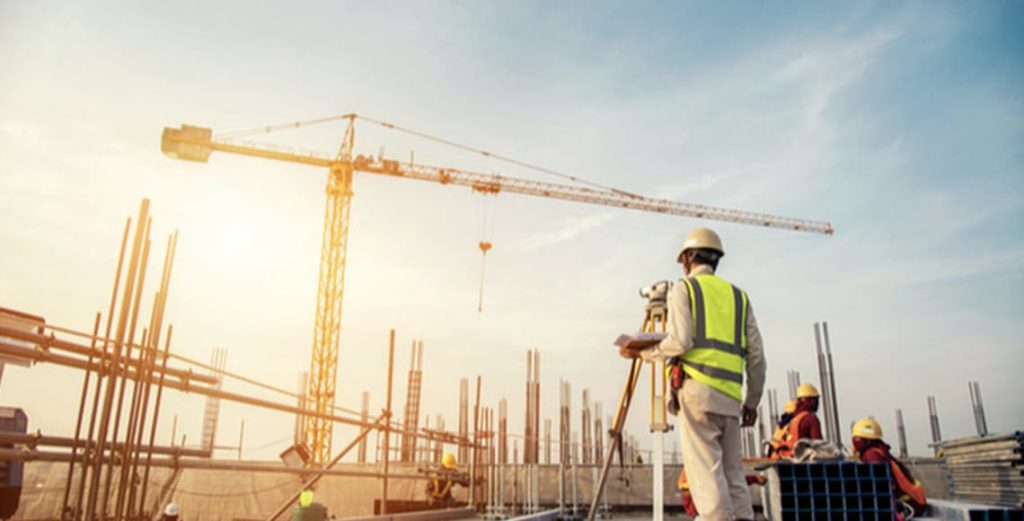
[vc_row][vc_column][vc_column_text]The Occupational Safety and Health Administration (OSHA) enforces strict rules on providing workers on construction sites with bathroom facilities. If you fail to comply with these regulations, you could face hefty fines and operations may have to stop.
To observe these rules, construction companies typically turn to porta-potty rentals. However, the problem with porta-potties is that because of their dimensions; they have specific placement requirements.
A standard porta-potty weighs 230 – 250 lbs; it stands about 88” – 91” high. They have to be kept away from curbs, main roads, walkways, and driveways. Most importantly, they can only be placed in areas accessible for servicing. It means they typically stay on a ground level where trucks can easily access them – making porta-potties a hassle to reach for any worker working on one of the higher floors.
Also, the price of porta-potties doesn’t only vary depending on the type of unit but on how often you have them serviced. A construction company with a bigger budget may have enough money to have their porta-potties cleaned regularly. But what if the company can only afford to have their porta-potties serviced once a month?
However, the scary truth is that it doesn’t matter if porta-potties are cleaned and serviced once a week or once a month; on a hot day, the bacteria in sewage goes into overdrive. The stench in a porta-potty on a summer day is unbearable. However, the smell is the least of your worries because it’s the viruses and diseases that will ultimately harm your health. Touch a contaminated porta-potty door handle, wall, or seat, and you could walk out with Hepatitis A, norovirus, salmonella, or shigellosis.[/vc_column_text][vc_column_text]
It’s true that porta-potties have long dominated construction sites and outdoor events; however, porta-potties are no longer the only solution that can meet your crew’s sanitary needs. Portable lavatory systems prove they are the more hygienic and more cost-effective option.
OSHA’s rules state that portable toilet facilities can be installed without a structure, as long as they provide suitable privacy. The Brief Relief Lavatory System comes with a privacy shelter, a Commode, a full-sized seat, and portable Waste Bags.
The Brief Relief Privacy Enclosure is a large, sound-reducing enclosure built to provide maximum privacy and comfort. The enclosure’s side panels are designed to reduce sound by 3-5 decibels from inside and out and conform to OSHA noise-reduction standards. It’s built from flame-resistant PVC with integrated spring locking fiberglass poles. It even comes with a detachable floor.
With the Brief Relief Lavatory System, each floor of the multi-story commercial building could have its own bathroom facility. It can be set up easily by a single person, that can be kept set up or packed it away at the end of each day.
Ultimately, portable lavatory systems at construction sites will increase productivity and dramatically lessen the amount of time a single bathroom break would take. They’re also much cheaper than porta-potty rental.[/vc_column_text][vc_separator][/vc_column][/vc_row][vc_row][vc_column][vc_column_text]
[/vc_column_text][/vc_column][/vc_row]
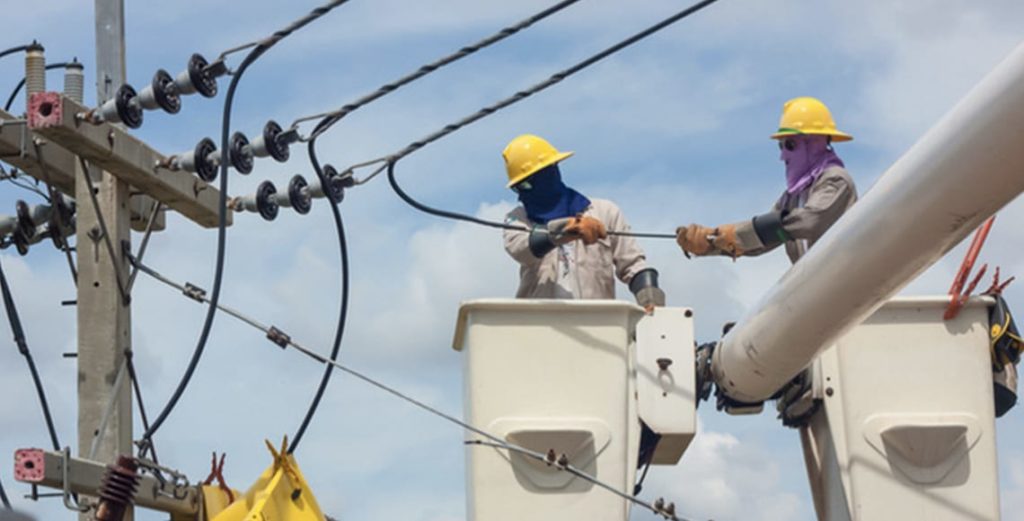
[vc_row][vc_column][vc_column_text]Electric utility workers face various challenges on the job. When it comes to electrical work, the smallest errors could result in significant damage to both workers and property. Without proper training and learning the different procedures and systems, the slightest mishap could lead to severe accidents or worse, death.
The job takes utility workers all over the community they serve. Meter readers travel to their utility customer’s locations to take readings of their usage. Depending on the size of the utility, workers may also be responsible for powering services on and off.
Electric line workers also often find themselves on the road as they travel to customers’ locations when they need to install meters. In times of power outages due to inclement weather, electric line workers may be called out to repair high voltage wires, splice cables, and whatever it takes to restore power.
Because electric utility workers often find themselves on the road, it’s inevitable for them to feel the urge to use the bathroom. However, a running toilet won’t always be available. Not all homeowners are open to letting strangers into their house to use the facilities. In other cases, the nearest bathroom may not be around for miles.
Fortunately, there’s a sanitary solution that gives hardworking electric utility workers a bathroom within reach no matter where they are located.[/vc_column_text][vc_column_text]
When you store a Portable Lavatory System in your utility truck, you have a sanitary and convenient solution for all your bathroom needs.
The Brief Relief Commode sets up quickly as a sturdy 5-gallon base with a full-size soft foam toilet seat that fits firmly on top. Each Commode comes with a supply of Brief Relief Daily Restroom Packs, portable Waste Bags that take care of any solid or liquid waste.
The Brief Relief Disposa-John Portable Restroom is designed for men and women. For extra sanitation, it comes with an antimicrobial wipe and toilet paper. All Brief Relief products were designed to withstand travel, making them ideal for utility workers who visit various locations and spend long hours on the road.
For added privacy, you can use the Brief Relief Shelter; it’s a privacy tent that sets up in less than 2 minutes and can set up virtually anywhere. Because it’s ultra-lightweight and compact, you can store it in the utility truck with the rest of your gear.
Set-up of the portable lavatory system is easy. You line the Commode with a Brief Relief Disposa-John waste bag, do your business, and let the bag’s exclusive blend of polymers and enzymes deodorize and transform the waste into a gel. You can throw the used wipe and toilet paper right into the bag and seal it shut. The Wag bags are safe to throw in any regular trash container.[/vc_column_text][vc_separator][vc_column_text]
Brief Relief’s patented bags come with safe chemicals that treat waste. Brief Relief also offers portable commodes and privacy shelters, providing employees with a private bathroom that can easily pop up and be taken down wherever they need it.
[/vc_column_text][/vc_column][/vc_row][vc_row][vc_column][vc_column_text]
[/vc_column_text][/vc_column][/vc_row]

[vc_row][vc_column][vc_column_text]Solar farm owners and developers can’t set up solar farms just anywhere; smaller solar farms need to span a few acres while large utility solar farms require hundreds of acres of land. Locations that boast sunny weather year-round are ideal. Likewise, sites with no mountains or obstructions to the south that have plenty of incoming sunlight all day are most favorable. The land should also be relatively flat so that the solar panels can be set up on the stable ground.
Because of the unique requirements of solar farm placement, solar farms usually station in remote areas near the wilderness. Therefore, solar farm sites typically don’t have access to plumbing and running toilets.
Large utility solar farms employ hundreds of workers, making the lack of bathroom facilities an even bigger issue. To meet OSHA regulations, solar farms often only provide the required number of porta-potties on site. However, porta-potties are notorious for being breeding grounds for bacteria and disease. And, due to solar farms’ locations, the porta-potties are also likely positioned directly under the sun, creating an imaginably unbearable environment of heat and odor from the hot sewage.
The lack of accessible and sanitary bathroom facilities can be distracting, causing workers to lose focus on their work. There’s also the issue of the amount of time it takes employees to reach the porta-potties which are probably quite a distance away from the job site.[/vc_column_text][vc_column_text]
To prevent workers from going into the neighboring wilderness and using the outdoors to relieve themselves, Brief Relief has created a straightforward solution to meet workers’ sanitary bathroom needs. With Brief Relief, there’s no need to hold it in and put your bladder health at risk. There’s also no need to use the porta-potties.
The Brief Relief Field Lavatory System is ideal for work crews on the move or assigned in remote areas such as solar farms. It comes with a Privacy Shelter, commode, and portable Waste Bags.
The privacy shelter comes with integrated spring locking poles that make setup fast and easy, completely deploys in less than 2 minutes. For stability, the free-standing structure comes with ropes and anchors. It also folds away into a small carrying bag. It’s water-repellent, flame-resistant, and non-conductive. It also has an inside zipper and lock for added user privacy.
When you line the inside of the commode with a portable Waste Bag, it’s no more complicated to use than a regular toilet. The Commode sets up instantly as a sturdy 5-gallon base with a full-size soft foam toilet seat that fits firmly on top.
The Brief Relief Disposa-John wag bag contains a unique blend of polymers which deodorize and transform liquid and solid waste into a gel. Each kit comes complete with an antimicrobial wipe and toilet paper. Once you’re done, you remove the bag from the commode, seal it shut, and it’s ready to be thrown away in a regular trash can.[/vc_column_text][vc_separator][/vc_column][/vc_row][vc_row][vc_column][vc_column_text]The unique locations of solar farms call for unique bathroom solutions. Check out our Portable Lavatory System to see how Brief Relief can improve working conditions on solar farms. [/vc_column_text][/vc_column][/vc_row]
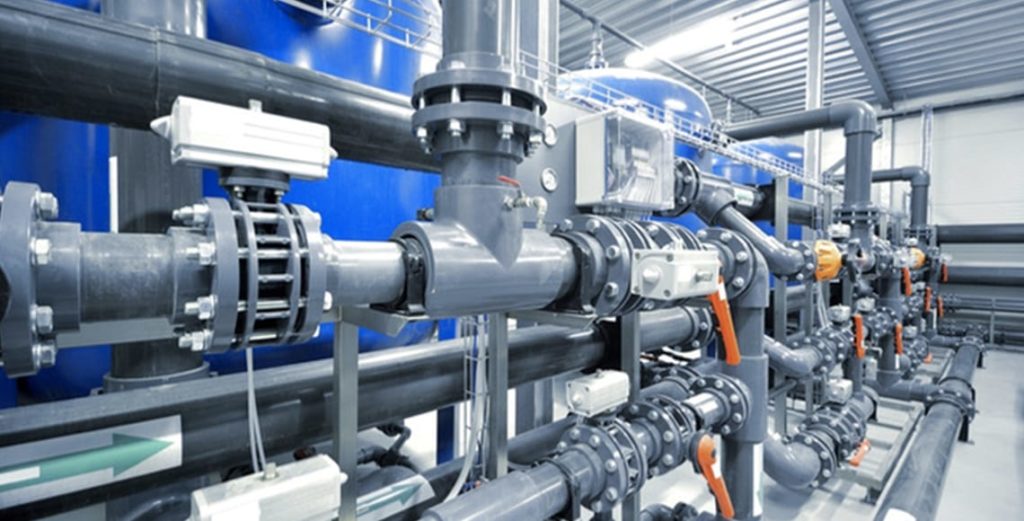
[vc_row][vc_column][vc_column_text]A job as a gas utility worker means excellent pay, comprehensive training, fantastic benefits, and plenty of opportunities for travel.
Working in utilities come with a lot of perks; however, there’s also a downside of the job that not always a hot topic of conversation: bathroom habits. The reality of a job in utilities is that you may often find yourself in situations where everyday luxuries like running bathrooms aren’t within reach.
A career in gas utilities can take you to every corner of the community you serve. You inspect meters, install and monitor gas mains, and maintain or expand infrastructure. As a multi-skill technician, your duties likely include the sampling of natural gas liquids, meter proving, calibrations, and tank gauging. You are on call for emergencies such as suspected gas leaks and may need to provide support for other techs.
As a job requirement, you agree to go wherever the job demands, which may take you to an array of locations. You work indoors or outdoors in all types of weather conditions. Your job could take you on the road or in traffic for hours. You could also find yourself in remote areas. In all these situations, you may find yourself without access to a running toilet.
Even if you were on the job and inspecting a gas appliance in a customer’s home, there’s no guarantee they will let you use their bathrooms. Some homeowners are uncomfortable about allowing outsiders to use their private facilities. While this may seem unneighborly, it’s their right and one you must respect.[/vc_column_text][vc_column_text]
Whether you’re on the road or can’t access the facilities on site, you don’t have to torture yourself and put your bladder health at risk by holding it in. There’s no need to speed to the next rest stop, use an unsanitary container, or in worst case situations, commit open defecation, which is a criminal offense.
When you pack portable Waste Bags in the utility truck glove compartment, you always have a bathroom within reach.
Brief Relief offers portable Waste Bags that take care of any liquid or solid waste. With the Brief Relief Disposable Urinal Bag and Disposa-John Portable Restroom, you have a portable lavatory system that seals the wastes while polymers and enzymes work to break down the pee or poop and convert them into a deodorized gel.
Once used, you can seal them securely thanks to their multiple closures. Because the wastes are in a gel state, there’s no sloshing around in the bag. They’re landfill-safe and can be thrown away in any regular trash receptacle.
With Brief Relief, utility workers can concentrate on their jobs, minimize downtime, and increase productivity. They help mitigate health and safety risks on the job and eliminate legal issues created by employees who relieve themselves where they shouldn’t.[/vc_column_text][vc_separator][/vc_column][/vc_row][vc_row][vc_column][vc_column_text]
[/vc_column_text][/vc_column][/vc_row]